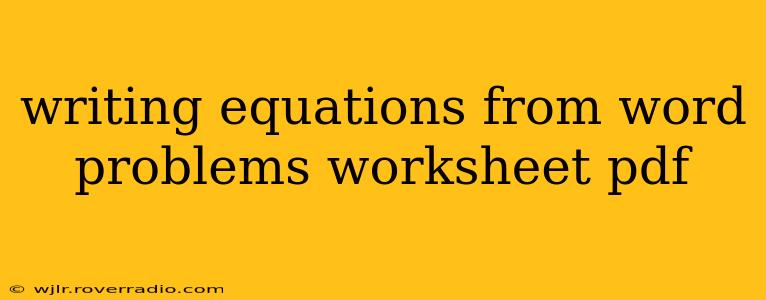Creating mathematical equations from word problems is a crucial skill in algebra and beyond. It bridges the gap between real-world scenarios and abstract mathematical representations. This guide will walk you through the process, offering strategies and examples to help you confidently translate word problems into solvable equations. We'll also address common challenges and provide tips for mastering this essential skill.
Understanding the Process: From Words to Equations
The key to success lies in carefully dissecting the problem. Break down the word problem step-by-step, identifying the unknowns (variables), the known quantities, and the relationships between them. Look for keywords that indicate mathematical operations:
- Addition: sum, total, increased by, more than, added to
- Subtraction: difference, decreased by, less than, subtracted from, minus
- Multiplication: product, times, multiplied by, of
- Division: quotient, divided by, per, ratio
Common Types of Word Problems and How to Tackle Them
Word problems come in various forms, each requiring a slightly different approach. Let's explore some common types:
1. Simple Linear Equations
These problems often involve a single unknown and a straightforward relationship.
Example: "John is 5 years older than his brother, Tom. If the sum of their ages is 23, how old is Tom?"
Solution:
- Identify the unknowns: Tom's age (let's call it 'x')
- Express John's age in terms of Tom's age: John's age = x + 5
- Write the equation based on the given information: x + (x + 5) = 23
- Solve the equation: 2x + 5 = 23 => 2x = 18 => x = 9. Therefore, Tom is 9 years old.
2. Problems Involving Percentages
Percentage problems often require translating percentage increases or decreases into equations.
Example: "A shirt is on sale for 20% off. If the sale price is $24, what was the original price?"
Solution:
- Identify the unknowns: Original price (let's call it 'x')
- Express the sale price in terms of the original price: x - 0.20x = 24
- Solve the equation: 0.80x = 24 => x = 30. The original price was $30.
3. Problems Involving Geometry
Geometric word problems often involve formulas for area, perimeter, volume, etc.
Example: "The length of a rectangle is twice its width. If the perimeter is 30 cm, find the length and width."
Solution:
- Identify the unknowns: Width (w) and length (l)
- Express the length in terms of the width: l = 2w
- Use the perimeter formula: 2l + 2w = 30
- Substitute the expression for 'l': 2(2w) + 2w = 30
- Solve the equation: 6w = 30 => w = 5 cm. Therefore, the length is 10 cm (2w).
4. Problems Involving Multiple Unknowns
These problems require setting up a system of equations.
Example: "The sum of two numbers is 15, and their difference is 3. Find the two numbers."
Solution:
- Identify the unknowns: Let the two numbers be x and y.
- Write the equations based on the given information: x + y = 15 and x - y = 3
- Solve the system of equations (using substitution or elimination): Adding the two equations gives 2x = 18, so x = 9. Substituting x = 9 into either equation gives y = 6. The two numbers are 9 and 6.
Tips for Success
- Read carefully: Understand the problem fully before attempting to write the equation.
- Define variables: Clearly label your unknowns.
- Translate keywords: Use keywords to identify the appropriate mathematical operations.
- Check your work: Substitute your solution back into the original equation to verify it's correct.
- Practice consistently: The more you practice, the better you'll become at translating word problems into equations.
Frequently Asked Questions (FAQs)
What are some common mistakes students make when writing equations from word problems?
Common mistakes include misinterpreting keywords, incorrectly defining variables, and making arithmetic errors when solving the equation. Careful reading and a step-by-step approach can help minimize these errors.
How can I improve my problem-solving skills in this area?
Consistent practice is key. Work through a variety of problems, starting with simpler ones and gradually increasing the complexity. Seek help when needed and review your mistakes to learn from them.
Are there any resources available to help me practice?
Many online resources, textbooks, and workbooks offer practice problems on writing equations from word problems. Search for "algebra word problems" or "equation word problems" to find suitable resources.
By following these strategies and practicing regularly, you can develop the skills to confidently translate word problems into solvable equations, opening up a world of mathematical problem-solving possibilities.
